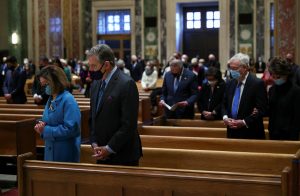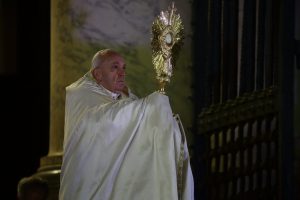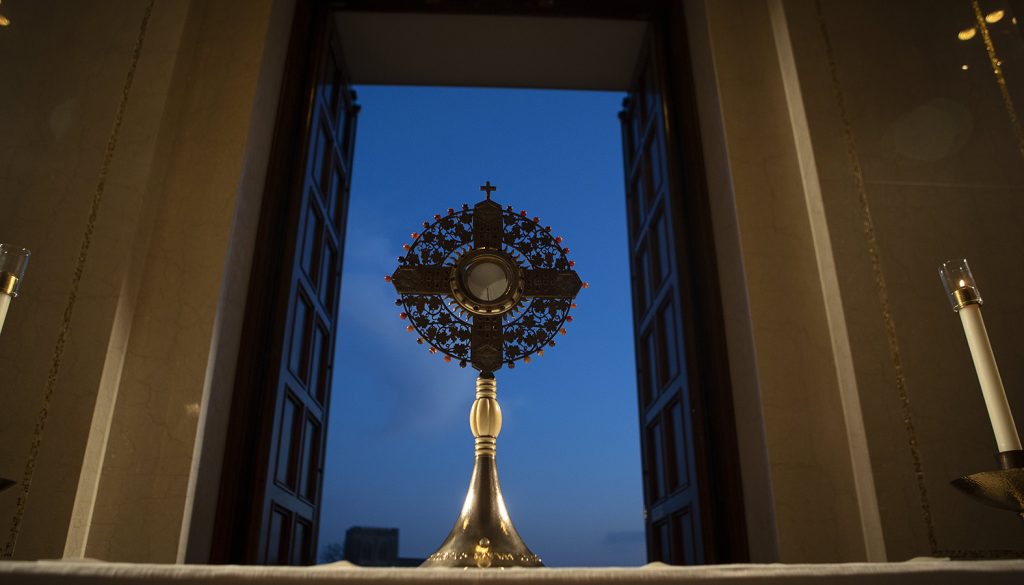The Eucharist is Jesus.
Communicating that might just be the greatest challenge of our lives. So many of our fellow Catholics don’t even know it or, if they have heard it, believe it.
Years ago, in a book called “Being Catholic Now” edited by Robert F. Kennedy Jr.’s daughter Kerry Kennedy, current Speaker of the House Nancy Pelosi wrote about the first Communion of one of her grandchildren. Before Mass, they were lying on a bed, as the girl explained to her grandmother: “That it is the body and blood of Christ. When we go to church, it is the body and blood of Christ.”
Pelosi then explains that the girl’s mother then responds: “Yes, the host and the wine represent the body and blood of Christ.” The granddaughter corrected her elder, proving she had a real Catholic education: “Not represent. It is the body and blood of Christ.”
Pelosi then wrote: “My granddaughter was buying into it, okay. But it is hard. Every Sunday for me it’s hard. Christ had died, Christ is risen, Christ will come again. Now think of it, we say that every week. Do I really believe he’s coming again? Yes, I believe he’s coming again. Christ died, Christ is risen, Christ will come again. This is my body, this is my blood. They’re asking a lot. In my era, we didn’t question any of it.”
Here in the United States, we are having all kinds of debates about eucharistic coherence and the reception of the Eucharist by politicians who publicly support abortion. But our problem runs deeper. On a fundamental level, it’s not about abortion, nor about politics. It’s about our unbelief.

In 2008, the Democratic National Convention was in Denver, where Archbishop Charles J. Chaput was assigned at the time. During Sunday night Mass before the opening of the convention, he preached: “If you’re Catholic and you disagree with your Church, what do you do? You change your mind.”
I often wonder if people truly know what the Church really teaches about things, or if they have had a real encounter with our eucharistic Lord.
At the opening of a conference on the anniversary of St. Pope John Paul’s book “Ecclesia in America,” then-Cardinal Joseph Ratzinger talked about the challenges of secularism and issues that plague human life and families. He referenced abortion, as well as other kinds of violence.
He said, “All these important questions require careful study. Yet in addition to their technical evaluation, the Catholic Church is convinced that the light for an adequate solution can only come from encounter with the living Christ, which gives rise to attitudes and ways of acting based on love and truth. This is the decisive force which will transform the American continent.”
And then he continued:
“Dear friends, the love of Christ impels us to devote ourselves without reserve to proclaiming his Name throughout America, bringing it freely and enthusiastically to the hearts of all its inhabitants. There is no more rewarding or beneficial work than this. There is no greater service that we can provide to our brothers and sisters. They are thirsting for God. For this reason, we ought to take up this commitment with conviction and joyful dedication, encouraging priests, deacons, consecrated men and women and pastoral agents to purify and strengthen their interior lives ever more fully through a sincere relationship with the Lord and a worthy and frequent reception of the sacraments. This will be encouraged by suitable catechesis and a correct and ongoing doctrinal formation marked by complete fidelity to the word of God and the Church’s Magisterium and aimed at offering a response to the deepest questions and aspirations of the human heart. The witness of your faith will thus be more eloquent and incisive, and you will grow in unity in the fulfilment of your apostolate. A renewed missionary spirit and zealous generosity in your commitment will be an irreplaceable contribution to what the universal Church expects and needs from the Church in America.”
This cannot happen without our complete devotion to Jesus Christ in the Eucharist. The sacramental life is the only way for there to be any kind of true renewal in the Church in the world.
I participated in a working group on marriage, family, and youth at that same conference. Person after person, including most ministry leaders, counseled that whatever ministry you do, always include time for eucharistic adoration. The Holy Spirit can do things we could never dream of.
This is what it means to trust in God and let him take the lead. The Trinitarian life is the only life for a Christian to live, and yet, Pope Francis has referred to confirmation as the sacrament of “so long,” where so many young people complete their sacramental lives. Even for those who continue to attend Mass, the spiritual reading and formation ends at that point.

We spend so much time on screens, missing reality or protecting ourselves from it. Christianity is incarnational — we’re never going to get to a graced place of so-called eucharistic coherence until we actually encounter one another and Jesus.
When I look at him in the Blessed Sacrament, I have peace. When I gaze on him in a monstrance, I know who I am and what I am meant for. When I am before him in eucharistic exposition, nothing else matters but him and his victory over sin and death. Everything else pales in comparison.
Most if not all of us have gotten back together with friends since the COVID-19 shutdown. Have we gone to eucharistic adoration? Have we melted before our eucharistic Lord?
The Dominican Father Reginald Garrigou-Lagrange, OP, once wrote:
“A father who is about to die wishes to leave to his children a supreme proof of his love for them. Often such a father cannot find words to express his love and he remains silent with a silence that is more eloquent than speech. When Jesus was about to die he found not only the words to express his meaning but also the words which would make his meaning a reality, the words of transubstantiation. He gave us the Eucharist as a testament, and in this sacrament he left to us his own divine Person.…
“There are times when we yearn for the real presence of loved ones who are no more. The Eucharistic heart of the Savior has given us the real presence of his body, his blood, his soul, and his divinity. ...
“The Eucharistic heart of Jesus has given us the Eucharist as a sacrifice, in order to perpetuate in substance the sacrifice of the cross on our altars until the end of the world and to apply its fruits to us. And at the Holy Sacrifice of the Mass, our Lord who is the principal Priest continues to offer himself up for us.”
Mere words can’t make people understand this. People are going to need to see fellow human beings being transformed by their encounters with Jesus in the Eucharist.
Pope Francis continuously talks about “encuentro” (“encounter”) — and it is, in fact, his visual way of doing that with so many different people throughout his pontificate that inspires a desire to love more deeply and completely. Those of us who watched the COVID-19 prayer service he led in St. Peter’s Square saw that the source of all that is good and true and beautiful is Jesus Christ.
You can’t give what you can’t know. God’s love for us is resplendent in the Eucharist. What on earth is keeping us away?
There is one thing you can be sure of: It’s not God keeping us away, it is Satan. And only one has won the victory of eternity. Go to the one to whom your soul belongs. As so many souls cry out in misery, we must quench the thirst of our Savior who is their hope, so that we may be his monstrances in the world.

